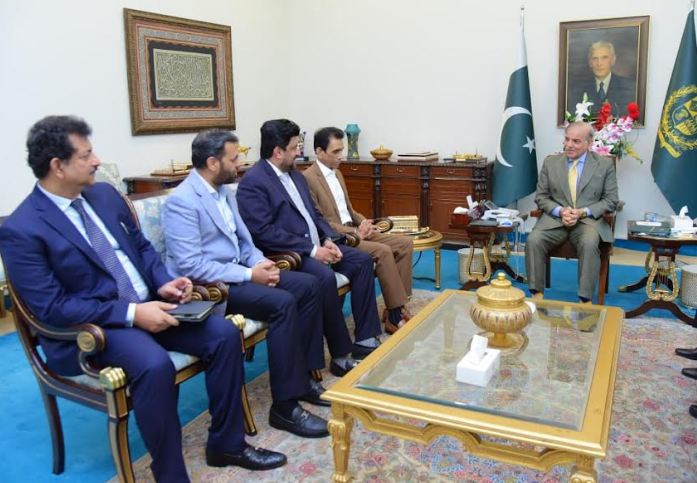Staff Report
ISLAMABAD: A delegation of Mutahida Qaumi Movement (MQM) led by the Convenor Dr. Khalid Maqbool Siddiqui called on Prime Minister Muhammad Shehbaz Sharif here on Wednesday and discussed in detail the matter of formation of caretaker governments besides overall current political situation in the country.
Federal Minister for Information Technology Syed Amin ul Haque, Governor Sindh Kamran Khan Tessori, Dr Farooq Sattar and Mustafa Kamal were also part of the delegation.
Minister for Railways and Aviation Khawaja Saad Rafique and Minister for Economic Affairs Sardar Ayaz Sadiq were present in the meeting. The meeting was held in connection with the prime minister’s consultations with the allies with respect to formation of the caretaker governments. During the meeting matter of recent population census also came under discussion.
The delegation paid tributes to the prime minister on personally monitoring the federal government’s ongoing projects in Karachi and ensuring speedy work on these projects on priority basis.
The MQM delegation also praised PM Shehbaz Sharif and his economic team’s efforts for completing the agreement with the International Monetary Fund (IMF).
In a surprising turn of events, Pakistan’s Prime Minister Shehbaz Sharif announced on Sunday that his government would hand over power to a caretaker setup before the completion of its tenure next month, indicating the dissolution of the National Assembly days before its term ends to expedite the general election in November.
This change of stance comes shortly after Shehbaz had initially stated that his government would complete its tenure, which is set to end on August 13. However, it appears that his decision has been influenced by advice from Asif Ali Zardari, the leader of the allied Pakistan People’s Party (PPP).
According to a senior PPP leader, Zardari urged Shehbaz during a meeting on Saturday to dissolve the National Assembly a few days before the government’s tenure concludes, allowing for elections to be held in November. Under the Constitution, if the National Assembly completes its term, elections must take place within 60 days. However, dissolving the assembly prematurely, even by a single day, would provide the government with a 90-day window to conduct the elections.
The National Assembly’s five-year term began under the Pakistan Tehreek-e-Insaf government of Imran Khan on August 12, 2018, and is slated to conclude under the ruling coalition led by Shehbaz. Speaking at a laptop distribution ceremony in Sialkot, Shehbaz stated, “Our government will complete its term next month. We will hopefully go before the tenure’s completion, and the new interim government will take over.”
He also expressed confidence that if his party, the PML-N, emerges victorious in the upcoming general elections, it will transform the destiny of the country.
Previously, Shehbaz had indicated that his government’s tenure would conclude next month, and the Election Commission of Pakistan would announce the election date.
This has led to varied interpretations, with some political analysts suggesting a lack of alignment between mainstream parties and the establishment regarding the timing of the polls.






